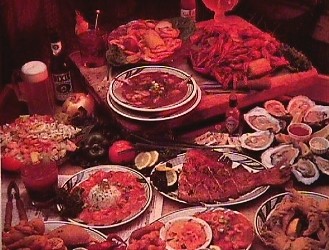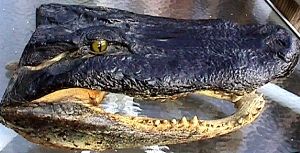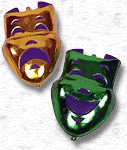
Cajuns specialize in plain, simple meals which are filling and tasty for country folk. They take cooking and foods seriously and take great pride in them.
Appetizers are rarely found in Cajun kitchens. Very seldom, if ever, is an appetizer served since the Cajuns fear it would only ruin their appetite before a good meal. Cajuns love sweets but rarely eat dessert after a hearty meal. You'll find that Cajuns don't make a lot of different salads because they seldom eat them. In the few salads they do make, they never peel the tomatoes or remove their seeds. Also, they always season their meats before putting them in the pot to cook.
Cajun cooking may be time consuming, but is well worth what you put into it. It has to be. Cajuns love eating their foods as much as they love preparing them. To truly understand Cajun food, you have to understand the Cajun people.
Cajun Folk - Background

To the uninitiated, a Cajun is a crude ignorant backwoodsman who speaks little or no English. Perception would have him making his living fishing, trapping, or farming a few acres of land and his principal interests are boozing, eating, and having a good time. Perhaps there are such people in Acadiana, but they are a minority and are in no way characteristic of the Cajun
people.
Instead, Cajuns have a long and proud heritage on this continent. This heritage began in 1604 when the first French settler colonized Nova Scotia. Much like America's first colonists, they fought to civilize a new world, bringing the culture and language of France to their adopted land.
England gained control of Nova Scotia with the Treaty of Utrech in 1713 and life became unbearable for the Cajuns. As French Catholics living under the rule of English Protestants, the Cajuns found themselves despised and persecuted. Between 6,000 and 7,000 were deported to the American colonies. However, most of the colonies also had laws prohibiting Catholics to live within their borders, so life didn't get much better.
Others sought refuge in the Caribbean or among the Native American Indian wilderness. Others, were deported to England, and eventually found their way to France. Refugees from all these groups eventually found their way to Louisiana. There they founded their own communities. In a climate unlike any they had known before; surrounded by plants and animals for which they had no names in their native language, the Cajuns created a new language and a new culture. It even became necessary to create a new way of cooking since many of the ingredients they had known were unavailable - replaced by the abundant seafood and game of south Louisiana. Small, family-owned stores and meat markets still exist in southwest Louisiana in testimony to the impact this had on the lives of the Cajuns.
 With the mainstay wildlife including the once endangered allegator and snapping turtle in bountiful numbers, it is not unusual to find such a trophy as pictured here, in the typical cajun home. When the Acadiens came into the bayou country from New Orleans, the Indians here could not pronounce "Acadien." Therefore, the term, "Cajun" was readily adapted because it was easier to pronounce. However, the words Cajun and Acadien do not have the same meaning. The word Cajun applies only to those whose Acadien ancestors came to Louisiana after the eviction of 1755. The broader term, Acadien, applies to all the descendants of the original Acadiens, regardless of where they live. Thus, all Cajuns are Acadiens, but not all Acadiens are Cajuns.
With the mainstay wildlife including the once endangered allegator and snapping turtle in bountiful numbers, it is not unusual to find such a trophy as pictured here, in the typical cajun home. When the Acadiens came into the bayou country from New Orleans, the Indians here could not pronounce "Acadien." Therefore, the term, "Cajun" was readily adapted because it was easier to pronounce. However, the words Cajun and Acadien do not have the same meaning. The word Cajun applies only to those whose Acadien ancestors came to Louisiana after the eviction of 1755. The broader term, Acadien, applies to all the descendants of the original Acadiens, regardless of where they live. Thus, all Cajuns are Acadiens, but not all Acadiens are Cajuns.
Many thousand of Acadiens live in different parts of the United States and Canada. These folks are not Cajun. However, by extension, the title of Cajun is properly applied to those people (regardless of national origin) who have inter-married with Cajuns and have been absorbed into the Cajun culture and speak the Cajun language. Today, historians agree that the culture the Cajuns developed is one of the most unique and impressive in the world. They also agree that the Cajuns have played a significant role in American history as they struggled to survive. Throughout the rebirth of Acadia, the Cajuns stuck together. They minded their own business, kept apart from the rest of the world and supported each other. In the 20th century, oil brought riches to the Cajuns. Yet even this hasn't changed them much.
 Cajuns still are as they always were: a fun-loving, God-fearing, hard-working, passionate people. Over a million of these French-speaking citizens exist in our country today, a tribute to their determination and the power of the human will. In spite of the tribulations endured, today's Cajuns still maintain a joie de vivre and a "live and let live" attitude which is admired by all who know them. They are ready with a smile, a joke and a handshake for anyone willing to accept it. They'll give you the shirt off their back or the beer out of their glass and expect nothing in return, but are graciously humble to accept any hospitality extended to them.
Cajuns still are as they always were: a fun-loving, God-fearing, hard-working, passionate people. Over a million of these French-speaking citizens exist in our country today, a tribute to their determination and the power of the human will. In spite of the tribulations endured, today's Cajuns still maintain a joie de vivre and a "live and let live" attitude which is admired by all who know them. They are ready with a smile, a joke and a handshake for anyone willing to accept it. They'll give you the shirt off their back or the beer out of their glass and expect nothing in return, but are graciously humble to accept any hospitality extended to them.
This is what I know a Cajun to be...and as any of them would say proudly... "Where y'at wi'dat...mon ami?
En francais En espanol
Louisiana Products

Cajun Folk - Background
Instead, Cajuns have a long and proud heritage on this continent. This heritage began in 1604 when the first French settler colonized Nova Scotia. Much like America's first colonists, they fought to civilize a new world, bringing the culture and language of France to their adopted land. England gained control of Nova Scotia with the Treaty of Utrech in 1713 and life became unbearable for the Cajuns. As French Catholics living under the rule of English Protestants, the Cajuns found themselves despised and persecuted. Between 6,000 and 7,000 were deported to the American colonies. However, most of the colonies also had laws prohibiting Catholics to live within their borders, so life didn't get much better.
Others sought refuge in the Caribbean or among the Native American Indian wilderness. Others, were deported to England, and eventually found their way to France. Refugees from all these groups eventually found their way to Louisiana. There they founded their own communities. In a climate unlike any they had known before; surrounded by plants and animals for which they had no names in their native language, the Cajuns created a new language and a new culture. It even became necessary to create a new way of cooking since many of the ingredients they had known were unavailable - replaced by the abundant seafood and game of south Louisiana. Small, family-owned stores and meat markets still exist in southwest Louisiana in testimony to the impact this had on the lives of the Cajuns.
 With the mainstay wildlife including the once endangered allegator and snapping turtle in bountiful numbers, it is not unusual to find such a trophy as pictured here, in the typical cajun home. When the Acadiens came into the bayou country from New Orleans, the Indians here could not pronounce "Acadien." Therefore, the term, "Cajun" was readily adapted because it was easier to pronounce. However, the words Cajun and Acadien do not have the same meaning. The word Cajun applies only to those whose Acadien ancestors came to Louisiana after the eviction of 1755. The broader term, Acadien, applies to all the descendants of the original Acadiens, regardless of where they live. Thus, all Cajuns are Acadiens, but not all Acadiens are Cajuns.
With the mainstay wildlife including the once endangered allegator and snapping turtle in bountiful numbers, it is not unusual to find such a trophy as pictured here, in the typical cajun home. When the Acadiens came into the bayou country from New Orleans, the Indians here could not pronounce "Acadien." Therefore, the term, "Cajun" was readily adapted because it was easier to pronounce. However, the words Cajun and Acadien do not have the same meaning. The word Cajun applies only to those whose Acadien ancestors came to Louisiana after the eviction of 1755. The broader term, Acadien, applies to all the descendants of the original Acadiens, regardless of where they live. Thus, all Cajuns are Acadiens, but not all Acadiens are Cajuns.Many thousand of Acadiens live in different parts of the United States and Canada. These folks are not Cajun. However, by extension, the title of Cajun is properly applied to those people (regardless of national origin) who have inter-married with Cajuns and have been absorbed into the Cajun culture and speak the Cajun language. Today, historians agree that the culture the Cajuns developed is one of the most unique and impressive in the world. They also agree that the Cajuns have played a significant role in American history as they struggled to survive. Throughout the rebirth of Acadia, the Cajuns stuck together. They minded their own business, kept apart from the rest of the world and supported each other. In the 20th century, oil brought riches to the Cajuns. Yet even this hasn't changed them much.
 Cajuns still are as they always were: a fun-loving, God-fearing, hard-working, passionate people. Over a million of these French-speaking citizens exist in our country today, a tribute to their determination and the power of the human will. In spite of the tribulations endured, today's Cajuns still maintain a joie de vivre and a "live and let live" attitude which is admired by all who know them. They are ready with a smile, a joke and a handshake for anyone willing to accept it. They'll give you the shirt off their back or the beer out of their glass and expect nothing in return, but are graciously humble to accept any hospitality extended to them.
Cajuns still are as they always were: a fun-loving, God-fearing, hard-working, passionate people. Over a million of these French-speaking citizens exist in our country today, a tribute to their determination and the power of the human will. In spite of the tribulations endured, today's Cajuns still maintain a joie de vivre and a "live and let live" attitude which is admired by all who know them. They are ready with a smile, a joke and a handshake for anyone willing to accept it. They'll give you the shirt off their back or the beer out of their glass and expect nothing in return, but are graciously humble to accept any hospitality extended to them.This is what I know a Cajun to be...and as any of them would say proudly... "Where y'at wi'dat...mon ami?
Louisiana Products
